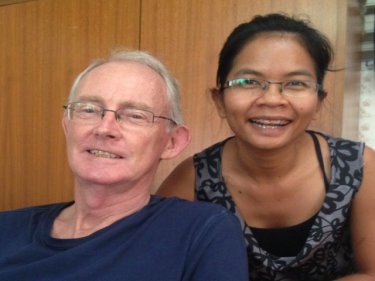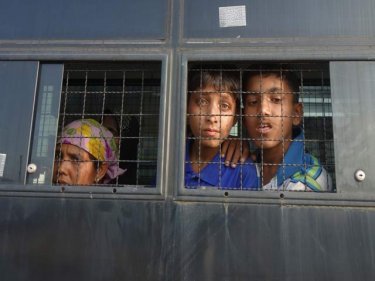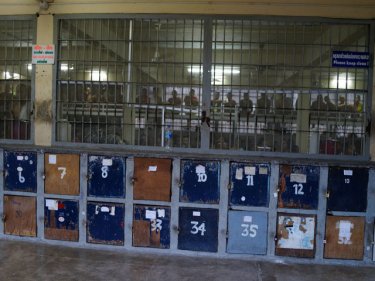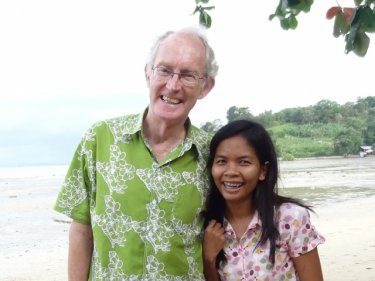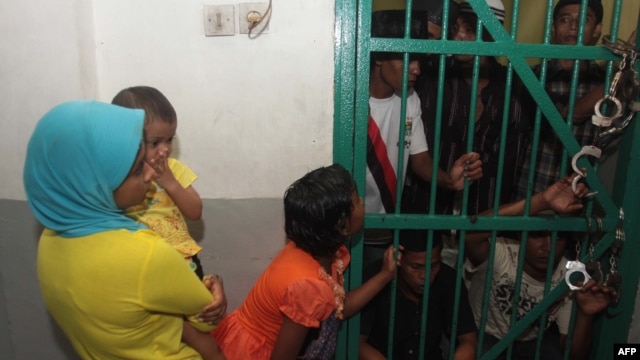PHUKET: A captain acting on behalf of the Royal Thai Navy has accused two
Phuketwan journalists of damaging the reputation of the service and of breaching the Computer Crimes Act.
Two other journalists from the Reuters news agency are expected to face similar charges shortly.
The
Phuketwan journalists, Alan Morison and Chutima Sidasathian,
denied the charges and were fingerprinted when they presented
themselves today at Vichit Police Station, south of Phuket City.
They are due to reappear on December 24. The pair face a maximum jail term of five years and/or a fine of up to 100,000, baht
It's believed to be the first time an arm of the military in Thailand
has sued journalists for criminal defamation using the controversial
Computer Crimes Act.
The accusations come from Captain Panlob Komtonlok of Royal Thai Navy 3,
which oversees the Andaman Sea coast, and they centre on a paragraph in
a report by Reuters on July 17 that was in part republished in
Phuketwan later the same day.
In response to presentation of the charges today, Alan Morison and Chutima Sidasathian issued the following statement:
PHUKETWAN is a small news outlet based on Phuket with a very small
staff. Our main aim is to end corruption and make Thailand a better
place for residents and visitors.
The Royal Thai Navy, according to Wikipedia, has more than 70,000 active
personnel. One of the Navy's aims, we believe, is also to make Thailand
a better place.
Despite the difference in size, relations between the two organisations have always been cordial since
Phuketwan was launched in 2008.
Both organisations have a deep interest in Rohingya boatpeople from
Burma (Myanmar). The Navy apprehends the boatpeople or ''helps on''
boats towards Malaysia. Phuketwan reports what happens to these people.
Ironically, it was Navy Vice Admiral Supot Pruksa who first introduced
Phuketwan journalists to the word ''Rohingya'' during an interview at
the Navy Base on Phuket in October, 2008.
Just a few weeks later, the Royal Thai Navy supplied
Phuketwan with photographs of boatpeople being apprehended, and laid out in neat rows on Andaman beaches.
And it was a Royal Thai Navy spokesman who first suggested in December
2008 that the United Nations should be involved in the process of
dealing with the increasing numbers of boatpeople fleeing Burma.
'Human Rights Tragedy on Phuket's Doorstep,' that article began. ''LARGE
numbers of Rohingya have been sailing 'like sardines in a can' to the
Andaman coast of Thailand this month, seeking refuge from starvation and
persecution.''
Phuketwan took the hint from the Royal Thai Navy and began
seriously investigating what was happening to Rohingya boatpeople off
the coast of Thailand.
We discovered that Thailand's military was involved in inhumane
pushbacks. When other news organisations accused the Navy of being
involved,
Phuketwan's journalists defended the Navy.
We said it was not the Navy but another branch of the military. Since
then, we have continued to closely report what has been happening to the
Rohingya boatpeople.
We are shocked to learn now that the Navy is using a controversial law to sue
Phuketwan for criminal defamation.
The allegations in the article are not made by
Phuketwan. They are made by the highly-respected Reuters news agency, following a thorough investigation.
The article specified in the document is headlined 'Thai Military Profiting From Trade in Boatpeople, Says Special Report.'
It is likely that the Reuters account was published in scores of
newspapers all around the world. The mystery is why the Navy has chosen
to sue
Phuketwan journalists over these allegations.
It should be noted that
Phuketwan continues to admire and support the Royal Thai Navy in several ways.
We applaud the Navy in rescuing hundreds of tourists, stranded offshore
from Phuket and the Andaman coast in violent storms. At such times,
they will always be heroes.
We also support the Navy's program of protecting and preserving the
Andaman region's turtles. We seldom miss the annual hatchling release
at the Navy's Cape Panwa base on Phuket.
Phuketwan has even suggested that Navy officers should be put in
charge of all of Phuket's beaches so that they can protect the natural
environment and at the same time impress tourists with their grace and
charm.
It should be noted that
Phuketwan has won international awards for upholding human rights and for its investigative reporting of the Rohingya issues.
The Rohingya have no spokesperson, no leader, but through
Phuketwan's ongoing coverage, the torment of these people continues to be revealed.
Their forced exodus from Burma is a great tragedy. Yet how they are
treated in the seas off Thailand and in Thailand remains a constant
puzzle.
We wish the Royal Thai Navy would clear its reputation by explaining
precisely what is happening to the Rohingya in the Andaman Sea and in
Thailand.
By instead using a controversial law against us, the Navy is, we believe, acting out of character.
We can only wonder why a good organisation finds it necessary to take
such unusual action instead of making a telephone call or holding a
media conference.







 Charged: Alan Morison will face a Thai court next month. Photo: Supplied
Charged: Alan Morison will face a Thai court next month. Photo: Supplied

 A Rohingya child at Kiryana Talaab camp in Jammu waiting for his father and mother to return home.
A Rohingya child at Kiryana Talaab camp in Jammu waiting for his father and mother to return home.

